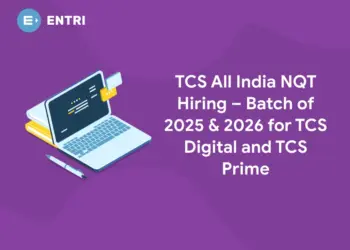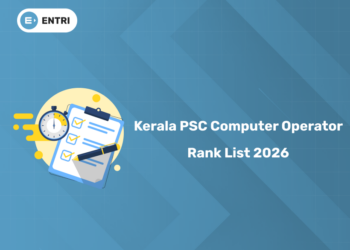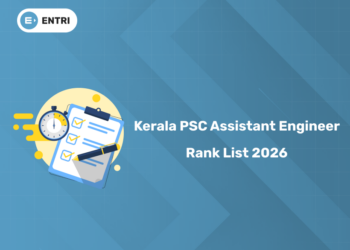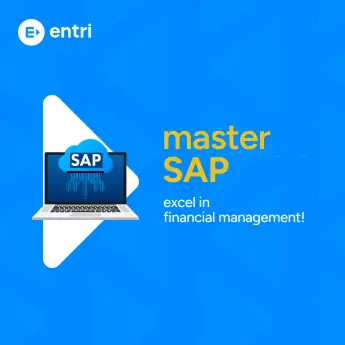Table of Contents
The demand for SAP MM (Materials Management) Analysts has been steadily increasing as businesses strive to optimize their supply chain and inventory management processes. SAP MM is a crucial module within the SAP ERP (Enterprise Resource Planning) system that manages procurement and inventory activities. Becoming a SAP MM Analyst in 2025 offers promising career prospects, competitive salaries, and opportunities for professional growth. In this comprehensive guide, we’ll walk you through everything you need to know—from educational qualifications and certifications to step-by-step guidance on building a successful career as a SAP MM Analyst.
Join Entri’s SAP MM Training Course today!!
SAP MM Analyst: Educational Requirements & Certifications
Academic Background
A strong academic foundation is essential for a career in SAP MM. Most employers seek candidates with a bachelor’s degree in areas that complement the technical and business facets of the role. Key fields include:
- Business Administration: Focuses on management principles and organizational strategies.
- Supply Chain Management: Provides a deep understanding of logistics, procurement, and inventory management.
- Information Technology: Equips you with the technical knowledge needed for ERP systems.
- Engineering: Offers problem-solving skills and process optimization techniques.
- Finance: Enhances your understanding of budgeting and cost control within supply chains.
SAP MM Analyst: Certifications
Certifications serve as a validation of your skills and show your commitment to staying updated with industry standards. They not only boost your resume but also demonstrate your technical proficiency in SAP MM. Below is a table summarizing key SAP MM certifications:
| Certification | Focus Area | Benefits |
|---|---|---|
| SAP Certified Application Associate – Procurement with SAP ERP | Basic to intermediate SAP MM functions | Validates core competencies in procurement, inventory management, and planning. |
| SAP S/4HANA Sourcing and Procurement Certification | Advanced processes in S/4HANA | Emphasizes the latest sourcing techniques and digital procurement methods. |
| SAP MM Module Training from Reputed Institutes | Hands‑on training and practical exposure | Provides practical experience with real‑world SAP MM scenarios. |
| SAP Global Certification in MM (Materials Management) | Comprehensive SAP MM expertise | Recognized globally and helps in career advancement across industries. |
Recommended Learning Path
- Degree Programs: Enroll in a relevant bachelor’s program that aligns with the core responsibilities of an SAP MM Analyst.
- Online Courses: Supplement your degree with online courses focused on ERP systems and SAP MM fundamentals.
- Workshops & Seminars: Participate in industry workshops that provide practical insights and networking opportunities.
- Certifications: Prioritize certifications that are recognized globally to enhance your credibility.
By combining academic qualifications with industry‑recognized certifications, you set a strong foundation for a thriving career in SAP MM.
Master SAP with Expert-Led Courses
Unlock your potential with our comprehensive SAP courses! Learn essential modules like SAP MM (Materials Management), SAP SD (Sales and Distribution), and SAP FICO (Financial Accounting and Controlling) from industry experts.
Know MoreSAP MM Analyst: Recommended Certifications
Embarking on a career as an SAP MM Analyst involves multiple stages of learning, practical exposure, and professional networking. Here’s a detailed, step‑by‑step guide:
1. Gain a Solid Educational Background
- Enroll in a Degree Program: Pursue a bachelor’s degree in Business Administration, Supply Chain Management, IT, Engineering, or Finance.
- Supplement with Specialized Courses: Look for additional courses in ERP systems, data analytics, and supply chain optimization.
- Develop Soft Skills: Communication, problem‑solving, and project management are equally important to succeed in this role.
2. Understand the Fundamentals of SAP MM
- Module Components: Learn about procurement, inventory management, invoice verification, and materials planning.
- System Navigation: Gain familiarity with the SAP interface and how different modules interact.
- Practical Exercises: Engage in hands‑on practice sessions using SAP demo systems or simulation software.
3. Enroll in Targeted SAP MM Training Programs
- Choose Accredited Programs: Research institutes or online platforms that offer SAP MM training with a strong track record.
- Attend Workshops: Participate in interactive sessions and live projects to understand real‑world challenges.
- Join Study Groups: Engage with fellow learners and professionals through forums and discussion groups to share insights.
4. Earn SAP MM Certification
- Preparation: Utilize study guides, practice tests, and sample questions available online.
- Exam Strategy: Develop a study plan that covers all the topics outlined in the certification syllabus.
- Certification Bodies: Consider certifications from SAP itself or recognized training partners that are highly regarded in the industry.
5. Build Practical Experience
- Internships: Gain experience through internships in companies that use SAP ERP systems.
- Freelance Projects: Consider working on freelance projects to apply theoretical knowledge in a practical setting.
- Entry‑Level Positions: Start with roles that allow you to work under seasoned professionals, helping you build confidence and expertise.
6. Develop Analytical and Technical Skills
- Data Analysis: Learn to interpret large datasets to derive actionable insights.
- Technical Proficiency: Master the use of reporting tools, database management, and the SAP ERP system.
- Continuous Learning: Stay updated with the latest trends and updates in SAP modules by subscribing to industry publications and online forums.
7. Network with Industry Professionals
- Professional Forums: Join online communities such as SAP Community Network (SCN) and LinkedIn groups dedicated to SAP professionals.
- Conferences and Meetups: Attend industry conferences, webinars, and local meetups to expand your professional network.
- Mentorship: Seek guidance from experienced SAP MM Analysts who can provide insights into career progression and industry practices.
Following these steps diligently will not only prepare you for certification but also equip you with the practical skills needed to thrive in the competitive job market.
SAP MM Analyst: Step-by-Step Guide
1. Gain Relevant Educational Background
Pursue a bachelor’s degree in a relevant field. Consider additional courses in supply chain management, ERP systems, or business management to strengthen your knowledge base.
2. Understand SAP MM Fundamentals
Familiarize yourself with the SAP MM module, including its functionalities such as procurement, inventory management, invoice verification, and materials planning.
3. Enroll in SAP MM Training Programs
Choose accredited training programs that offer hands-on experience with SAP MM. Look for courses that provide practical exposure to real-world scenarios.
4. Earn SAP MM Certification
Complete the recommended SAP MM certifications to validate your expertise. Certification exams typically cover SAP MM processes, configuration, and integration with other modules.
5. Build Practical Experience
Gain experience through internships, freelance projects, or entry-level positions. Working with SAP MM in a practical environment will enhance your skills and confidence.
6. Develop Analytical and Technical Skills
An SAP MM Analyst must possess strong analytical abilities to interpret data and make informed decisions. Additionally, technical skills such as SAP ERP proficiency, database management, and reporting tools are beneficial.
7. Network with Industry Professionals
Engage in SAP communities, forums, and professional networks. Networking can provide insights into industry trends, job opportunities, and best practices.
SAP MM Analyst: Career Growth
The career path of an SAP MM Analyst can lead to advanced roles such as:
- SAP MM Consultant
- Supply Chain Manager
- Procurement Specialist
- SAP Project Manager
- ERP Consultant
Master SAP with Expert-Led Courses
Unlock your potential with our comprehensive SAP courses! Learn essential modules like SAP MM (Materials Management), SAP SD (Sales and Distribution), and SAP FICO (Financial Accounting and Controlling) from industry experts.
Know MoreSAP MM Analyst: Job Opportunities
Industries Hiring SAP MM Analysts
- Manufacturing
- Retail
- Pharmaceuticals
- Automotive
- Technology
Conclusion
Embarking on a career as an SAP MM Analyst in 2025 can open doors to dynamic opportunities and career growth. Whether you are starting fresh or transitioning from a related field, following the right educational and professional path can lead to success.Entri offers comprehensive courses tailored to aspiring SAP MM Analysts. With expert-led modules, practical exercises, and an up-to-date curriculum, Entri ensures that learners are industry-ready.
Join Entri’s SAP MM Training Course today!!
Master SAP with Expert-Led Courses
Unlock your potential with our comprehensive SAP courses! Learn essential modules like SAP MM (Materials Management), SAP SD (Sales and Distribution), and SAP FICO (Financial Accounting and Controlling) from industry experts.
Know MoreFrequently Asked Questions
What is the salary range for an SAP MM Analyst in 2025?
While salaries depend on location and experience, SAP MM Analysts can expect to earn between $60,000 and $90,000 annually. With increased expertise and certification, this figure can grow significantly.
Can I pursue SAP MM training online?
Yes, many platforms, including Entri, offer flexible online courses that allow you to learn at your own pace. This makes it easier to balance work, study, and personal commitments.
Which industries are most in need of SAP MM Analysts?
Industries such as manufacturing, retail, pharmaceuticals, automotive, and technology highly value SAP MM expertise due to their reliance on efficient supply chain and inventory management processes.










